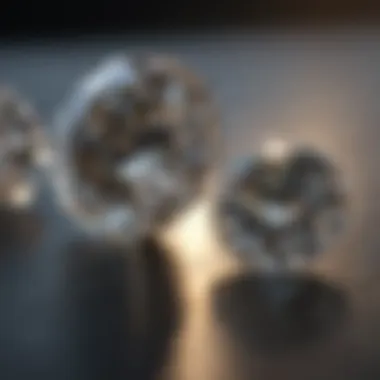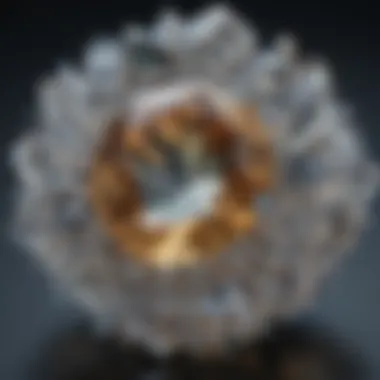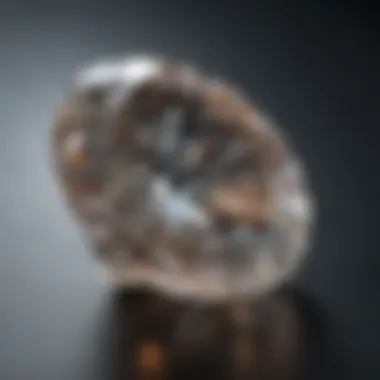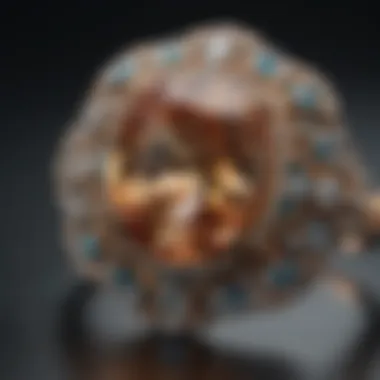Moissanite vs Swarovski: A Comprehensive Comparison of Gemstone Alternatives


Overview of Gemstones and Minerals
Gemstones and minerals hold a fascinating history of human adornment and cultural significance. From ancient times to modern society, these precious stones have adorned royals, symbolized power and love, and captured the essence of beauty. Gemstones play an integral role in our culture and are revered for their allure and mystique. They are not merely accessories but also repositories of history and artistry, adding depth and significance to jewelry and other decorative items.
In geological terms, gemstones are formed through intricate processes deep within the Earth's crust. The journey of a gemstone from its inception to its final form is a marvel of nature's forces. These stones are composed of various minerals, each imparting unique properties such as color, clarity, and durability. Understanding the formation processes of gemstones provides insights into their rarity and beauty.
Significantly, gemstones are classified based on a set of defining properties which include color, hardness, and luster. Each gemstone exhibits a distinct color profile, ranging from vibrant hues to subtle tones. Hardness, measured on the Mohs scale, determines a gemstone's resistance to scratching and abrasion, reflecting its durability. Additionally, luster refers to the stone's shine and reflective quality, enhancing its visual appeal.
Gemstone Formation and Properties
The formation process of gemstones is a complex interplay of geological forces spanning millions of years. Gemstones are created under high pressure and temperature conditions deep within the Earth, where minerals crystallize to form these exquisite stones. Factors like mineral composition, organic materials, and geological events contribute to the formation of unique gem varieties.
Properties defining gemstones encompass a wide range of characteristics that differentiate one stone from another. These properties include color intensity, clarity, cut, carat weight, and optical phenomena like iridescence or asterism. Gemological laboratories grade gemstones based on these properties to delineate their quality and market value.
Classification of gemstones extends beyond their aesthetic appeal to include categories like precious and semi-precious stones. Precious gemstones like diamonds, rubies, sapphires, and emeralds are renowned for their rarity, beauty, and value. Semi-precious stones, such as amethyst, citrine, and garnet, also possess unique qualities but are more abundant in nature and thus have a lower market value.
Types of Gemstones
Exploring the realm of gemstones unveils a plethora of varieties, ranging from the common to the exotic and rare. While diamonds reign as the most coveted gemstone for their brilliance and durability, other popular gem types include rubies, emeralds, and sapphires. These gems are celebrated for their rich colors, clarity, and symbolic significance.
Beyond the mainstream gemstone varieties lie exotic and rare gems that captivate collectors and enthusiasts with their unique beauty and scarcity. Stones like alexandrite, tanzanite, and paraiba tourmaline are prized for their exceptional color-changing properties and limited geographical occurrences. These rare gemstones command attention for their distinctiveness and allure.
Identifying and Evaluating Gemstones
The value of a gemstone is determined by a myriad of factors that affect its rarity, quality, and desirability in the market. Gem professionals utilize various techniques and tools to identify and evaluate gemstones accurately, ensuring transparency and authenticity in the gem trade. Factors such as color saturation, inclusions, and fluorescence influence a gemstone's value and market demand.
Gemstone identification techniques encompass visual inspections, microscopes, refractometers, and spectroscopy to analyze a stone's physical and optical properties. Gemologists assess gemstone quality based on the presence of inclusions, clarity characteristics, and the overall cut of the stone, which impacts its brilliance and light performance.
Assessing gemstone quality involves a meticulous examination of the stone's color consistency, transparency, and presence of any enhancements. Treatments like heating, irradiation, and diffusion can alter a gem's color and clarity, impacting its natural appeal and value. Understanding these factors is essential for both buyers and sellers in the gemstone market.
Caring for Gemstones
Proper care and maintenance are essential to preserve the beauty and longevity of gemstones. Cleaning gemstones regularly with mild detergent and a soft brush helps remove dirt and residues that can dull their luster. Storing gemstones in a fabric-lined jewelry box or pouch prevents scratches and damage, ensuring their brilliance remains intact.
Common mistakes in gemstone care include exposing gems to harsh chemicals, extreme temperatures, or physical impact, which can result in chipping or discoloration. By avoiding these pitfalls and following preservation tips specific to each gem type, enthusiasts can safeguard their precious stones for generations to come. Maintaining gemstones' pristine condition prolongs their beauty and value, making them cherished heirlooms for future generations to enjoy.
Introduction


The comparison between Moissanite and Swarovski is not merely a debate on gemstones; it is a journey into the realm of exquisite alternatives that redefine the standards of brilliance. Delving into the depths of these gemstones goes beyond their aesthetic appeal; it uncovers a world of chemistry, physics, and craftsmanship that shape the essence of jewelry. As we embark on this exploration, we will unravel the intricacies that differentiate Moissanite and Swarovski, offering a nuanced perspective for gem aficionados, collectors, and jewelry designers seeking to elevate their creations.
Brief Overview of Moissanite and Swarovski
When discussing Moissanite and Swarovski, we are comparing two distinct avenues in the realm of gemstone alternatives. Moissanite, a crystalline form of silicon carbide, boasts exceptional durability and hardness. Its structural composition lends it a unique brilliance that rivals even the most illustrious gemstones. On the other hand, Swarovski crystals, crafted from lead glass, focus on brilliance and refractive index, creating a kaleidoscope of light that captivates the beholder. Understanding the fundamental variances between these two gemstones sets the stage for a detailed comparison that will unravel the mysteries behind their allure.
Purpose of the Comparison
The essence of this comparison lies in illuminating the distinguishing features of Moissanite and Swarovski to empower individuals in making informed decisions regarding gemstone selection. By dissecting their chemical compositions, physical attributes, and overall value propositions, we aim to provide a comprehensive guide for those navigating the realm of gemstone alternatives. Through this exploration, readers will gain insights into the unique characteristics of Moissanite and Swarovski, enabling them to align their preferences with a deeper understanding of these exceptional gemstones.
Composition and Properties
In this segment of the analysis on Moissanite versus Swarovski, delving into the chemical composition and properties provides a foundational understanding crucial for comparing these gemstone alternatives. Composition and properties play a pivotal role in determining the characteristics, brilliance, and durability of these gemstones, making it a focal point of examination in this article. By exploring the intricate details of their composition and properties, readers will gain valuable insights into what sets Moissanite and Swarovski apart in the world of gemstones.
Chemical Composition of Moissanite
Silicon Carbide Structure
The Silicon Carbide structure of Moissanite forms the basis of its exceptional hardness and brilliance, distinguishing it as a popular choice for gemstone alternatives. With a unique molecular arrangement, the Silicon Carbide structure contributes to Moissanite's remarkable durability, making it highly resistant to scratches and abrasions. This structure enhances Moissanite's longevity, ensuring that it maintains its luster and sparkle over time. While the Silicon Carbide structure provides Moissanite with its renowned brilliance, it also presents a challenge in terms of crafting and shaping due to its robust nature.
Hardness and Durability
The extraordinary hardness and durability of Moissanite are attributed to its composition within the Silicon Carbide structure. Ranking high on the Mohs scale, Moissanite displays exceptional toughness and resistance to external factors. This hardness ensures that Moissanite retains its pristine condition, even with everyday wear, making it a favored choice for jewelry that demands longevity and enduring beauty. Additionally, the inherent durability of Moissanite translates to minimal care requirements, simplifying maintenance for users seeking a long-lasting gemstone alternative.
Chemical Composition of Swarovski Crystals
Lead Glass Composition
Central to the brilliance of Swarovski Crystals is the Lead Glass composition, which plays a significant role in enhancing their refractive index and light dispersion capabilities. This composition results in unparalleled sparkle and radiance, making Swarovski Crystals a popular choice for those seeking vibrant and luminous gemstones. The Lead Glass composition also contributes to the versatility of Swarovski Crystals, enabling designers to create a wide array of color options and effects, further amplifying their appeal.
Brilliance and Refractive Index
Swarovski Crystals are known for their exceptional brilliance and high refractive index, characteristics that stem from their precise Lead Glass composition. The Brilliance and Refractive Index of Swarovski Crystals set them apart as premium gemstone alternatives, reflecting light with dazzling intensity. This feature makes Swarovski Crystals a preferable choice for jewelry pieces where luminosity and sparkle are desired. However, the high refractive index may pose challenges in certain designs, requiring careful consideration during the creation process to optimize the gemstone's visual impact.
Physical Characteristics
In this particular endeavour of exploring Moissanite vs Swarovski's realms, the emphasis on the Physical Characteristics section relays a crucial aspect of gemstone alternatives in scrutiny. Reflecting upon the specific nuances such as color variations, brilliance, and sparkle adds a layer of intrigue to our comparative analysis.
Color Variations


Moissanite Color Range
Dissecting the Moissanite Color Range holds a pivotal role in our discourse as it delineates the diverse spectrum of hues this gemstone offers. The trajectory shifts and shimmers within the Moissanite Color Range usher a unique allure and charisma, attributes imperative for discerning jewelry aficionados seeking novelty and sophistication. Visitors to this array of colors will find themselves enamored by the enthralling radiance and luxe exuded by the Moissanite Color Range, amplifying the overall allure of this gem in various settings. The inherent strength and mesmerizing resilience of the hues within the Moissanite Color Range make it a favorable choice for those discerning connoisseurs looking to refine their collections with a touch of opulence and style.
Swarovski Crystal Color Options
Intricately intertwined within the tapestry of our discussion, Swarovski Crystal Color Options unveil a new dimension of vibrancy and versatility. The strategic interplay of hues and tones within the Swarovski Crystal Color Options engenders a symphony of brilliance and opulence, elevating the essence of any piece adorning these crystals. Delving into the unique refractive index and depth resonating from the Swarovski Crystal Color Options, we uncover a blend of sophistication and charm, rendering them a sought-after choice for those with a penchant for exquisite facets. Nevertheless, the Swarovski Crystal Color Options do present a contrasting narrative marked by subtle nuances that may sway connoisseurs towards or away from its captivating allure, symbolizing a duality that propels the jewelry landscape forward.
Brilliance and Sparkle
Faceting Patterns
Unveiling the mesmerizing realm of Faceting Patterns in our narrative brings forth a medley of geometric precision and artistic finesse that defines the essence of each gemstone. The interplay between light and angles within the Faceting Patterns encapsulates a grandeur that is both aesthetically appealing and technically refined. Embracing the ingenuity of Faceting Patterns heralds a journey into the realm of consummate craftsmanship, where precision meets elegance, etching an indelible mark on the gemstone's allure. Navigating through the distinct facets and polished surfaces of Faceting Patterns, one can discern a timeless elegance that makes it a staple choice for jewelry aficionados seeking a blend of tradition and modernity.
Light Dispersion
Further elucidating on the theme of Light Dispersion, we unravel a spectacle of luminosity and radiance that adds depth and character to each gemstone. The intricate play of light within the Light Dispersion schema intertwines with the gem's intrinsic properties, creating a vibrant display of hues and tones that captivate the beholder. The unique prism-like effect engendered by Light Dispersion imbues a sense of magic and allure that resonates with those appreciative of the finer nuances in gemstones. Nevertheless, navigating the realm of Light Dispersion also uncovers its challenges and considerations, presenting a dual narrative that adds layers of intrigue to the overall gemstone selection process.
Durability and Maintenance
Durability and maintenance play a crucial role in any article discussing gemstone alternatives such as Moissanite and Swarovski. Understanding the durability and maintenance aspects of these gemstones is essential for consumers who want to make informed decisions about their jewelry choices.
When it comes to durability, Moissanite stands out for its exceptional hardness. Moissanite's hardness scale is close to that of diamonds, making it highly resistant to scratches and daily wear. This durability factor makes Moissanite a popular choice for engagement rings and other jewelry pieces that endure frequent use. On the other hand, Swarovski crystals are known for their brilliance but are more vulnerable to scratches due to their lead glass composition. Regular maintenance is crucial for preserving the sparkle and shine of both Moissanite and Swarovski crystals.
Scratch Resistance
Moissanite's Hardness Scale
Discussing the Moissanite's hardness scale provides valuable insights into why this gemstone is favored for its scratch resistance. Moissanite ranks high on the Mohs scale, offering excellent durability and toughness. Its exceptional hardness ensures that Moissanite jewelry maintains its beauty over time, even with daily wear. The unique feature of Moissanite's hardness scale lies in its ability to withstand scratches, making it a popular choice for individuals looking for long-lasting and resilient gemstone alternatives.
Swarovski Crystal's Vulnerability
Examining Swarovski Crystal's vulnerability sheds light on its susceptibility to scratches compared to Moissanite. Swarovski crystals, crafted from lead glass, are renowned for their brilliance and intricate designs. However, due to their composition, Swarovski crystals are more prone to scratches and potential damage. Understanding the vulnerability of Swarovski crystals emphasizes the importance of proper care and maintenance to prolong the lifespan of jewelry pieces adorned with these dazzling crystals.
Cleaning and Care Tips
Recommended Cleaning Methods


Delving into the recommended cleaning methods for Moissanite and Swarovski crystals is vital for maintaining their luster and brilliance. Using mild soapy water and a soft brush, gently clean Moissanite to remove any dirt or residue without causing damage. Avoid harsh chemicals that can affect the gem's sparkle. For Swarovski crystals, a soft cloth and lukewarm water can help maintain their shine while preventing scratches. Adopting appropriate cleaning methods enhances the longevity of these gemstones and ensures they retain their allure.
Avoiding Damage
Highlighting the importance of avoiding damage reinforces the significance of proper jewelry care. To prevent damage to Moissanite and Swarovski crystals, it is essential to store them separately from other jewelry pieces to avoid scratches. Refrain from exposing these gemstones to harsh chemicals or extreme temperatures, as it can affect their appearance and durability. By following simple guidelines to avoid damage, individuals can enjoy their stunning Moissanite and Swarovski crystal jewelry for years to come.
Cost and Value
In this intricate discussion of Moissanite versus Swarovski, delving deep into the world of gemstone alternatives, the aspect of Cost and Value shines as a pivotal point of consideration. When evaluating these gemstones, it is imperative to ponder not only their aesthetic beauty but also their financial worth. The Cost and Value section unveils a panorama of factors that play into the pricing dynamics and perceived value of Moissanite and Swarovski crystals. One of the fundamental pillars underpinning this comparison is the Price Comparison aspect. Meticulously examining the Factors Influencing Pricing reveals a multifaceted landscape that affects the final cost of these gemstone alternatives. From production costs to market demand, each element intricately weaves a tapestry of pricing intricacies. The unique characteristic of Factors Influencing Pricing lies in its ability to delineate the rationale behind the varying price points of Moissanite and Swarovski, empowering consumers with insightful knowledge. Yet, amidst its benefits, Factors Influencing Pricing also harbours challenges, like market volatility and production fluctuations, which can sway the gemstone pricing unpredictably. Furthermore, delving into the realm of Long-Term Investment sheds light on the enduring value proposition embedded within Moissanite and Swarovski crystals. Highlighting their longevity and resilience in jewelry pieces, Long-Term Investment underscores the sustainability aspect intertwined with these gemstone alternatives. A detailed examination of the durability, appeal retention, and market stability renders these gemstones not just as transient embellishments but as enduring investments. However, the Long-Term Investment aspect is not without its drawbacks, as it necessitates a strategic approach to gemstone acquisition and use to maximize returns and overall satisfaction. Moving on to Perceived Value in Jewelry, a paramount component in the gemstone world’s tapestry, we encounter two pivotal aspects: Luxury Appeal and Versatility. For Moissanite and Swarovski crystals, Luxury Appeal serves as a beacon of sophistication and elegance, elevating them to luxurious realms of adornment. Their inherent allure resonates with those seeking opulence without compromising on quality, making them coveted choices in high-end jewelry designs. Nevertheless, Luxury Appeal also imposes a sense of exclusivity that may alienate certain consumer segments, underscoring the intricate balance between opulence and inclusivity. Conversely, Versatility emerges as a defining trait that amplifies the allure of Moissanite and Swarovski crystals, catering to a diverse array of jewelry styles and preferences. Their innate flexibility in design integration and adaptability across various fashion trends position them as versatile gemstone alternatives, capable of seamlessly complementing any aesthetic vision. Nonetheless, the expansive Versatility dimension also unveils challenges, such as the need for conscious design curation to harness the full potential of these gemstones across different jewelry types and consumer preferences. Overall, the Cost and Value segment intricately dissects the intricate interplay of pricing dynamics and perceived value intricacies, shedding light on the multifaceted journey of acquiring and cherishing Moissanite and Swarovski crystals in the realm of gemstone alternatives.
Suitability for Jewelry Making
Within the realm of gemstone alternatives, the aspect of suitability for jewelry making plays a pivotal role in determining the choice between Moissanite and Swarovski. Jewelry designers, collectors, and enthusiasts meticulously assess the attributes of each gem to ensure it aligns with their creative vision and aesthetic preferences. When considering Moissanite, its remarkable hardness and durability stand out, making it an ideal choice for everyday wear jewelry pieces that require resilience against daily activities. On the contrary, Swarovski crystals with their unparalleled brilliance and range of colors are often favored for more intricate and glamorous jewelry designs that seek to captivate with their shimmer and sparkle. Understanding the suitability of these gemstones in jewelry making enables craftsmen to create pieces that not only embody beauty but also endure the test of time.
Popular Uses in Jewelry Design
Engagement Rings
Engagement rings hold a significant place in the realm of jewelry, symbolizing love and commitment. When it comes to Moissanite and Swarovski crystals, each offers distinct advantages for crafting these timeless symbols. Moissanite, known for its exceptional brilliance and toughness, provides a practical yet beautiful choice for engagement rings, ensuring lasting sparkle that withstands the rigors of everyday wear. On the other hand, Swarovski crystals with their unmatched clarity and refractive index add a touch of luxury and elegance to engagement ring designs, elevating the glamour quotient for the wearer. Whether opting for the fiery brilliance of Moissanite or the dazzling allure of Swarovski crystals, both gems shine brightly in the realm of engagement rings, embodying love and commitment in each glisten.
Earrings and Necklaces
Earrings and necklaces serve as versatile accessories that complement various outfits and occasions. When delving into the world of earrings and necklaces, the choice between Moissanite and Swarovski crystals unveils an array of design possibilities. Moissanite's colorless nature and high dispersion make it a favored choice for creating statement earrings and necklaces that exude sophistication and grace. Conversely, Swarovski crystals' vibrant color options and light play characteristics render them ideal for crafting eye-catching earrings and necklaces that command attention and add a pop of color to one's ensemble. Whether adorning oneself with the brilliance of Moissanite or the playfulness of Swarovski crystals, earrings and necklaces become a canvas for creativity and personal style, reflecting the wearer's unique flair.
Fashion Trends and Preferences
Moissanite in Modern Designs
The evolution of jewelry design in modern times has seen an increased incorporation of Moissanite due to its versatility and allure. When adorning modern designs, Moissanite shines as a sustainable and ethical alternative to traditional gems, appealing to consumers looking for both style and social responsibility. Its eco-friendly origins and exceptional fire make it a sought-after choice in minimalist and contemporary jewelry pieces that emphasize simplicity and elegance. Integrating Moissanite into modern designs not only elevates the aesthetic appeal of the jewelry but also aligns with the values of conscientious consumers who prioritize sustainability in their purchases.
Swarovski Crystals in High Fashion
High fashion embraces Swarovski crystals for their seamless blend of glamour and sophistication, making them a staple in haute couture. When exploring Swarovski crystals in high fashion, the marriage of craftsmanship and luxury becomes apparent as these crystals adorn runway creations with unmatched brilliance and radiance. Their versatility in color and shape enables designers to create intricate and opulent pieces that define opulence and luxury on the global stage. Swarovski crystals transcend mere embellishments, becoming essential components in high fashion jewelry that symbolize creativity, craftsmanship, and a commitment to excellence. Embracing the shimmer and allure of Swarovski crystals in high fashion ensures that every creation exudes a timeless elegance that captivates audiences and sets trends in the world of couture.
Conclusion
In this comprehensive guide contrasting Moissanite and Swarovski as gemstone alternatives, the Conclusion section serves as an essential component to tie together the diverse facets explored throughout the article. Delving deep, we have dissected the nuanced differences in composition, physical characteristics, durability, cost factors, and suitability for jewelry making between these two celebrated gemstone substitutes. The Conclusion segment encapsulates the essence of our comparison, offering a synthesized overview that encapsulates the essence of the debate surrounding Moissanite vs. Swarovski. By distilling the essential takeaways, this section empowers gem enthusiasts, collectors, and jewelry designers to make informed decisions when selecting the ideal gemstone for their distinct preferences and purposes.
Final Verdict
When we arrive at the Final Verdict of Moissanite versus Swarovski, it becomes evident that both gemstone alternatives showcase remarkable qualities deserving recognition in the realm of jewelry design. Moissanite, with its exceptional brilliance and hardness comparable to diamonds, presents a compelling option for those seeking durability and luxury appeal without the premium price tag. On the other hand, Swarovski crystals, renowned for their unparalleled light dispersion and color play, offer a unique sparkle that captures the essence of elegance and sophistication. The determination between Moissanite and Swarovski ultimately boils down to individual preferences, budget considerations, and specific design requirements, ensuring that both gems hold their own in the realm of fine jewelry craftsmanship.
Personal Preference and Purpose
Exploring the realm of personal preference and purpose in selecting between Moissanite and Swarovski elevates the decision-making process beyond mere gemstone properties. Understanding that personal tastes, style preferences, and intended uses play pivotal roles in gemstone selection underscores the significance of aligning the gem's inherent characteristics with the wearer's individuality. For individuals gravitating towards modern designs with a focus on sustainability and affordability, Moissanite emerges as a top choice, embodying a perfect blend of eco-consciousness and elegance. In contrast, Swarovski crystals cater to those admiring classic sophistication and statement-making jewelry pieces, amplifying the glamour quotient with their prismatic sparkle and timeless allure. By emphasizing personal aesthetics and intended jewelry applications, the selection between Moissanite and Swarovski transcends mere gemstone comparisons, delving into an intricate tapestry of style, personality, and sophistication.







